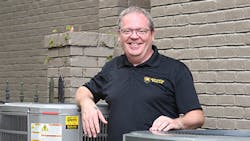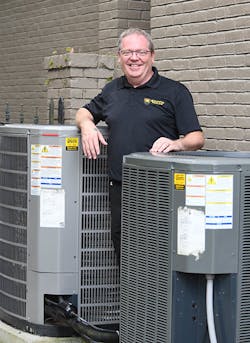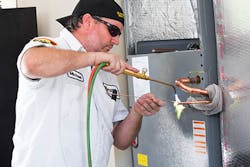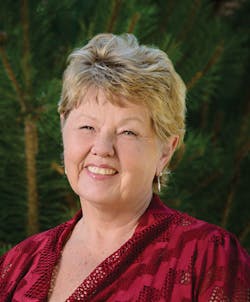HVAC Contractors & Distributors Prosper with Communication, Service, Planning
The HVAC distributor-contractor relationship works to the benefit of both parties when collaboration is the guiding principle, especially during the time of COVID-19, which has resulted in additional challenges to communications channels, says Tom Casey, owner of Griffin Services, based in the Jacksonville, Fla., metro area.
“People have been relying on automation and electronic systems to do the job of what used to be done with human interaction,” he explains. “Now, it's 'if you need anything, email me. If you need anything, text me.' COVID-19 has been detrimental to it because now there's no interaction. There's no onsite support. There's no onsite training. There's much less availability of vendor personnel.”
Casey says it becomes more a problem with larger, national suppliers with a corporate COVID-19 policy that dictates how branches communicate and support their contractor customers.
“I've had to say to some suppliers, who are underneath a national COVID protocol: ‘We're in Florida; what you're doing wherever you are in California is not the same as Florida. Somebody setting policy far away, it's not applicable here in a way that we can do business,’” he explains.
“I've had to say to some suppliers, who are underneath a national COVID protocol: ‘We're in Florida; what you're doing wherever you are in California is not the same as Florida.'" -- Tom Casey
-On the upside, this dynamic can give regional suppliers an advantage. Not every state has the same COVID-19 protocols, and if the regional distributor is taking the proper safety and health precautions as dictated by the state, it has much more to offer contractors.
Griffin Service does business with a manufacturer's factory branch, as well as two local HVAC distributors and one local plumbing distributor. Casey would like to see more effort in three areas to solidify the distributor-contractor relationship: effective communication, VIP support and collaborative business planning.
• Effective communication. This comes down to using phones and face-to-face visits (properly socially distanced according to local protocols) instead of conducting business only through email and text. It also means developing a hybrid approach to product and sales training — a mix of in-person and online education to ensure technicians are properly trained on new technology.
• VIP support. Casey equates this with the club maintenance and service programs he sells to his customers.
“I think distributors who recognize that they have different levels of customers and prioritize what I would call their member customers would be ahead of the game,” he explains. “If you're a club member, you should be put ahead of everybody else.
“Take the equipment shortage we had through the pandemic — don't sell your equipment to everybody,” Casey says. “Instead, distributors should reserve inventory for their contractors who are loyal to them.”
• Collaborative business planning. When contractors thrive, so do their distributor partners. So how can distributors help their most local contractors not only stay in business but thrive and grow? Casey would prefer distributors set up regular meetings, either in person or electronically, to talk about marketing plans or sales strategies or technical training.
“Too many distributors are focusing on moving boxes; they're selling to everybody and there's no loyalty there,” he notes. “I had some distributors say we could place all our orders online. Yeah, but what if I don't want to place them online? What if I need to talk to a human to place my orders because there are things I need to get across to you?”
Casey says distributors and contractors need more collaboration, not less. He says today’s wholesale suppliers are trying to “Amazon it,” which has caused a disconnect between the personalized service contractors provide their customers with the impersonal service they receive from HVAC and plumbing wholesale distributors.
“Everyone's pushing to automate in a business where the final delivery product is a human in front of a human,” he explains. “If you automate all these steps, are we transferring more responsibility for the quality, the accuracy, the frictionless nature of that final transaction to a guy who is a technical person? Are we putting too much stress on a guy who is supposed to be a craftsman to make up for all the dropped balls because no humans ever talked to each other up the line? I think there's a real issue with that.”
Working through the numbers — together — ensures a cohesive plan to achieve the stated goals successfully.
Everyone wants growth in 2021, especially after the devastation wrought by the SARS-CoV-2 coronavirus last year. But the distributor-contractor relationship is a symbiotic one, so discussing yearly goals is beneficial to both business partners. To get this growth percentage, how much more does the distributor need to sell? To sell that number, how many more calls does the contractor need each month?
Working through the numbers — together — ensures a cohesive plan to achieve the stated goals successfully.
The Benefits of Partnership
Kathie Todd, administrative manager for Central Oregon Heating and Cooling based in Redmond, Ore., says a strong "partner" relationship between a contractor and the distributor is manifested in lots of "specials."“Yes, the mutual benefit of a strong partner relationship with your distributor is access to special anything: pricing, special deals and promotions, marketing and advertising support, education and training, prizes, trips. special events, favors, specific product delivery/inventory, early info on products and STUFF! Your territory manager (TM) should be tuned in to"'It is practical to share what the dealer's intentions and goals are for coming year and/or specific time frame, concerning products and the need for certain equipment at a specific time.'
-- Kathie Todd
Todd spoke of close communication that she and Central Oregon Heating & Cooling enjoy with their territory manager and the distributor's management team, which helps the distributor get to know the contracting business clients dynamics.
"Distributors know what and how much you purchase on a regular and annual basis. They know what that means in market share for both dealer and distributor," Todd explains. "It is practical to share what dealer intentions and goals are for coming year and/or specific timeframe concerning products and the need for certain equipment at a specific time. A distributor must know, in fact, to have adequate inventory available. While we do not share actual financial information, we do share expected purchases for specific items and any increases above the usual. This may include special projects requiring specific product for specific time period. These tend to includes profit margins and such for pricing considerations. For marketing. co-ops, promotions and special advertising, numbers may be shared for those purposes only."
Regarding training, Todd offered this advice for how distributors can best serve contractors:
1. Have the ability to offer virtual and in-person training sessions, and have product hands-on training available when appropriate.
2. Be conscious of dealer work schedules. Accommodate their time need and time limits for technicians, sales and installation teams.
3. Ask the HVAC dealer what training issues they are experiencing, and offer training in special or specific areas that the distributor territory manager recognizes as having a need.
4. Training should be consistent and regular in doses that cover pertinent topics, including what might be new to the dealer, such as sales, CSR topics, inventory management.
5. Provide detailed instruction on “matching” equipment lines with products, for best results and upselling tips on specific related products in addition to equipment line. Explain ways to combine products to accommodate customers better, which will provide them with additional options. -- Terry McIver
WE WELCOME DISTRIBUTOR COMMENTS ON THIS ARTICLE. PLEASE COMMENT USING THE COMMENT TOOL BELOW.
About the Author

Kelly L. Faloon
Freelance Writer/Editor
Kelly L. Faloon is a contributing editor and writer to Contracting Business magazine, Contractor and HPAC Engineering. The former editor of Plumbing & Mechanical magazine, Faloon has more than 20 years experience in the plumbing and heating industry. She started a freelance writing and editing business in 2017, where she has a varied clientele.
Faloon spent 3 1/2 years at Supply House Times before joining the Plumbing & Mechanical staff in 2001. Previously, she spent nearly 10 years at CCH/Wolters Kluwer, a publishing firm specializing in business and tax law, where she wore many hats — proofreader, writer/editor for a daily tax publication, and Internal Revenue Code editor.
A native of Michigan’s northern Lower Peninsula, Faloon is a journalism graduate of Michigan State University. You can reach her at [email protected].
Terry McIver
Content Director - CB
As director of content for Contracting Business, he produces daily content and feature articles for CB's 38,000 print subscribers and many more Internet visitors. He has written hundreds, if not two or three, pieces of news, features and contractor profile articles for CB's audience of quality HVACR contractors. He can also be found covering HVACR industry events or visiting with manufacturers and contractors. He also has significant experience in trade show planning.



